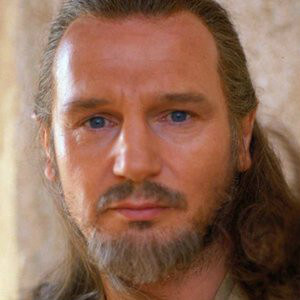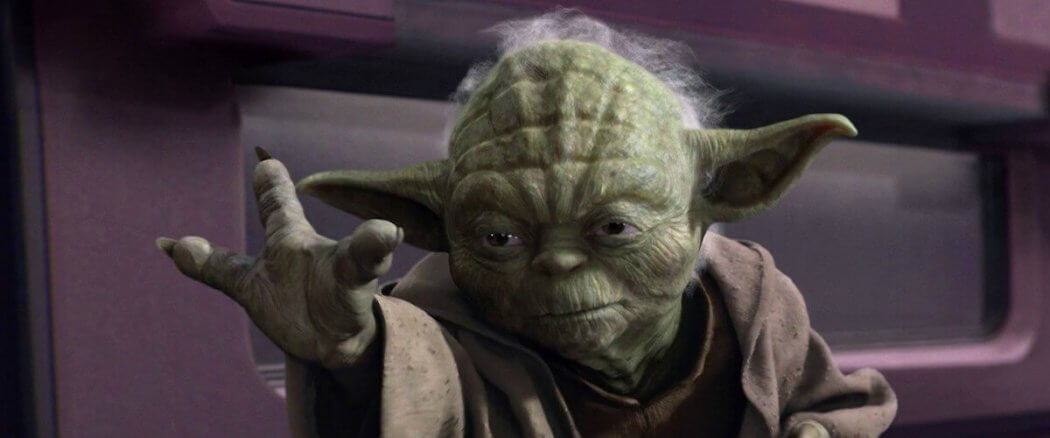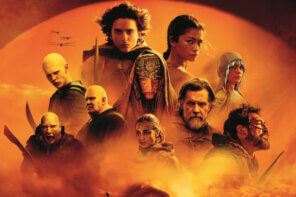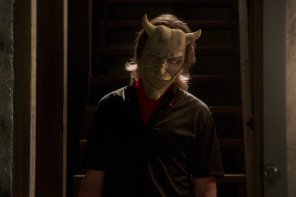I’d like to open the comments of this article to anyone who wishes to confess that they’ve tried to use the Force. Maybe you haven’t found yourself up-side-down like Luke Skywalker, lifting rocks up and gently moving them through the air. Perhaps you’ve never been able to rearrange the furniture in your living room while comfortably seated on your sofa. Yet if you were like me when you were in the tender years of pre-adolescence, then perhaps you at least attempted to use the Force in order to levitate your toy model of the Millennium Falcon. Feel free to confess. You’ll find there’s safety in numbers. Truth be told, I’m still not ruling out the possibility that one day I might be able to get the pen that’s on the desk in the corner without having to get out of bed. (In fact, I can think of a lot of ways that the Force might come in handy.)
A Theology Far, Far Away…
George Lucas’ concept of the Force is one of the more brilliant film ideas ever developed for the big screen, at least in terms of appeal to mainstream sensibilities. Its primary genius, as I see it, is to introduce a popular philosophical concept that is at once familiar but yet at the same time non-threatening. The Force isn’t defined enough so as to be directly related to a particular religion or form of spirituality. Lucas clearly wasn’t trying to simply substitute “the Force” for some other concept (prana or yin-yang or even god/s) in hopes of winning converts to his religion of choice or to his preferred spiritual perspective. He’s not a new age guru with a degree in film studies. There’s something sincere and genuine about the idea of “the Force” and the whole development of the Star Wars Universe. Lucas is a story-teller, and we get that, and it’s easy to buy into it.
On the other hand, for most of us the concept of the Force has a very familiar feel. Religious and non-religious, spiritual or even the non-spiritual, there’s something about the Force that resonates with something we believe about how the universe operates: that there’s something bigger, that we’re a part of something larger than ourselves. Lucas tapped into something primal that we all recognize from our very diverse religious and spiritual perspectives because he seems to have reached a level deeper than the levels on which we usually argue about theology or spirituality. No small task. As I was digging a little deeper into the Force (“feel it flowing through you!”) for this article, I found that this was no accident.
 The universality of the Force was part of Lucas’ fundamental approach. He intended to reach us at a deeper level. Lucas drew heavily on common mythology themes via the writings and ideas of Joseph Campbell and also called upon Jungian archetypes in hopes of telling a story with a universal resonance with his heroes and fiends. The same held true when he was putting together his notion of the Force. “The Force,” says Lucas, “evolved out of various developments of character and plot. I wanted a concept of religion based on the premise that there is a God and there is good and evil. I began to distill the essence of all religions into what I thought was a basic idea common to all religions and common to primitive thinking. I wanted to develop something that was nondenominational but still had a kind of religious reality.”
The universality of the Force was part of Lucas’ fundamental approach. He intended to reach us at a deeper level. Lucas drew heavily on common mythology themes via the writings and ideas of Joseph Campbell and also called upon Jungian archetypes in hopes of telling a story with a universal resonance with his heroes and fiends. The same held true when he was putting together his notion of the Force. “The Force,” says Lucas, “evolved out of various developments of character and plot. I wanted a concept of religion based on the premise that there is a God and there is good and evil. I began to distill the essence of all religions into what I thought was a basic idea common to all religions and common to primitive thinking. I wanted to develop something that was nondenominational but still had a kind of religious reality.”
In other words, we can be believers without being believers. For two hours we can find ourselves in a believable world, surrounded by a mystic, sacred presence that we recognize, but after the curtain falls, we won’t feel as though we’ve been proselytized into joining the church of George Lucas of Latter Day Saints. Genius, I say. Genius.
What is the Force?
The Force is a presence, so in that sense it might seem, at first glance, like another word for “god,” but it isn’t quite a god because the Force can also be understood to the point of being manipulated. Obi-Wan Kenobi (“Old Ben”) gives a young but eager Luke Skywalker a definition of the Force that is as enduring as it is basic: “Well, the Force is what gives a Jedi his power. It’s an energy field created by all living things. It surrounds us and penetrates us. It binds the galaxy together.” The Force is kind of a sacred presence, an ephemeral “energy” generated by all life forms but at the same time greater than its individual parts.
Although it is clearly a mystical phenomenon, in Episode One Lucas definitively tied this “energy field” to the real world via “midi-chlorians.” Qui-Gon Jinn, actually, clarifies for us. Well, to be specific, he’s speaking to Anakin Skywalker: “Without the midi-chlorians, life could not exist, and we would have no knowledge of the Force. They continually speak to us, telling us the will of the Force. When you learn to quiet your mind, you’ll hear them speaking to you.”
 The Force is inseparable from the physical world. It is an ominipresent, dynamic field created by the synergetic flow of energy from all life. It is at the same time both physical and spiritual. With training, one can learn to sense the nuances of this energy field. “When you learn to quiet your mind, you’ll hear them speaking to you.” Still your mind, get a feel for the Force, and then you can start rearranging the furniture from the comfort of your sofa. (Admittedly, though, it’s a good idea to have a mentor like Obi-Wan, Yoda, or Qui-Gon…Hm…for my money, though, I’d stick with Yoda or Qui-Gon.)
The Force is inseparable from the physical world. It is an ominipresent, dynamic field created by the synergetic flow of energy from all life. It is at the same time both physical and spiritual. With training, one can learn to sense the nuances of this energy field. “When you learn to quiet your mind, you’ll hear them speaking to you.” Still your mind, get a feel for the Force, and then you can start rearranging the furniture from the comfort of your sofa. (Admittedly, though, it’s a good idea to have a mentor like Obi-Wan, Yoda, or Qui-Gon…Hm…for my money, though, I’d stick with Yoda or Qui-Gon.)
George Lucas, Master of Divinity
In my own quirky way, I’m working toward a theological discussion point. As I ponder the Force and the whole story and religious dynamic of the Star Wars Universe, it strikes me that it might be a better way to access the biblical material than our modern perspectives typically allow. I’ve been recently reading through philosopher (and Roman Catholic) Charles Taylor’s impressive tome, A Secular Age (2007). I’m only about a third of the way through, but I have appreciated the great lengths to which Taylor goes to impress the reader with the enormous shift in worldview that occurred when Western Civilization exited the medieval era and entered modernity. What Taylor’s project ultimately seeks to tease out is the nuances of why religion is dying in the West and where it may be headed. Religion had a comfortable home in the pre-modern world due in large part to the fact that the pre-modern mind looked at the world as being “enchanted.” The modern self, by contrast, sees the world as operating according to impersonal natural law. For the modern mind, religion just really doesn’t resonate, as it did for a pre-modern.
So, in my next article, I’ll make the suggestion that by allowing our imaginations to inhabit the enchanted Star Wars Universe, we actually might have a good deal of insight into the workings of the biblical world, with its healings, exorcisms, pillars of fire, acts of divine justice, and talking donkeys. In the ancient world, these things would not seem at all strange or difficult to believe. For most moderns, it is impossible. “Not for me!” says the true believer. “God said it [via the Bible], I believe, that settles it.” Fair enough. On the other hand, in my next article, I’d like to make the somewhat provocative suggestion that even modern fundamentalist-oriented Christians who do keep the faith, who do believe in the virgin birth and the resurrection of the dead, that even the true believer who has faith in divine intervention, probably understands “miracles” in a way that’s quite different from the way a pre-modern would have viewed it. So, until then…well…what can I say? May the Force be with you.





